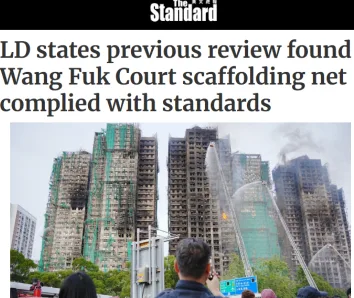The death toll at Tai Po reaches 94.
The Labour Dept last year said the netting used in renovation at Wang Fuk Court complied with fire-safety standards…
…as public anger grows over a resurfaced 2024 email in which the department described the fire risk from such nets as “relatively low”.
…In its reply on October 4 last year, the department explained that the primary purpose of installing the net is to limit the falling range of objects and stated that current regulations enforced by the department for construction sites contain no provisions covering flame-retardant standards for safety nets or any materials.
The department subsequently received a complaint arguing that this response was incorrect. After the investigation, it concluded that the initial reply “was unclear and had led to misunderstandings.”
DAB district council member and (I think) advisor to the owners’ committee Peggy Wong ‘dismissed fire safety concerns about the Wang Fuk work as malicious rumours misleading the public’. Is anyone looking into the tendering process for the project?
ABC of Australia on the community-run Google spreadsheet that updated the known status of apartments’ residents during the Tai Po fire.
HKFP guide to funds and charities aiding the Tai Po victims.
What happens to the site now? I guess they tear it down.
Oiwan Lam at Global Voices on the Hong Kong government’s attempts to boost voter turnout at the LegCo election in two weeks. She quotes a pan-dem now in the UK…
At the local level, high voter turnout can be seen as a vote of confidence in the John Lee administration, especially against the background of the Chief Executive election in 2027. […] The embarrassment is that Macau’s Legislative Election in September this year saw a high turnout of 53.35 percent, prompting Beijing officials to compare which ‘child’ performed better. In fact, Hong Kong officials reportedly visited Macau to study its voter mobilization tactics, fearing that low turnout in Hong Kong could be interpreted as public skepticism toward the political performance of Lee’s administration and the Central Government’s Hong Kong Liaison Office.
The government is thinking of postponing the election after the Tai Po fire.
Bitter Winter on a Chinese movie designed to push the idea of unification with Taiwan…
…“The Battle of Penghu” (澎湖海戰), a state-backed historical epic slated for release in 2026, dramatizes the Qing dynasty’s 1683 defeat of Ming loyalists in Taiwan. The film’s promotional trailer features the slogan “Unifying Taiwan is unstoppable”—a blunt encapsulation of Beijing’s political messaging. However, the backlash that followed suggests that even in tightly controlled media environments, history resists being reduced to propaganda.
The film centers on Shi Lang, a Qing admiral who led the conquest of Taiwan, defeating the forces of Ming loyalist Zheng Keshuang … Critics on Chinese social media questioned why the narrative glorifies the Qing, a foreign dynasty, while vilifying the Ming loyalists, who are often seen as defenders of Han Chinese sovereignty. Some even sarcastically proposed that Beijing’s next cinematic venture might celebrate Wu Sangui, the infamous Ming general who betrayed his dynasty to the Manchus.
…in attempting to draw a straight line from Qing conquest to modern-day claims over Taiwan, the state risks alienating those who see the Ming loyalists as patriotic resisters. The backlash was swift—and swiftly censored. Negative comments were scrubbed from Chinese platforms, leaving only official narratives and supportive voices visible.
…By weaponizing history through cinema, Beijing risks undermining its own credibility. When propaganda masquerades as art, and when dissenting interpretations are silenced, the result is not unity but skepticism. As the reaction to “The Battle of Penghu” shows, even carefully curated narratives can unravel when confronted with the messy truths of the past.
The barbarian Goths and Vandals who took over parts of the Roman Empire were already familiar with Roman culture and embraced it after taking control. Roughly similar story with the Manchus, who further Sinicized after defeating the Ming in order to consolidate their power. But to Southern Chinese, in particular, they were foreign invaders and the Ming who fled to Southeast Taiwan true Chinese. (Fascinating history, starring mostly Fujianese Ming loyalist Chinese, Dutch, Manchus and Taiwanese aborigines, with a guest appearance by the Spanish.)
The Qing established control over the western lowlands of Taiwan to suppress rebels. But they didn’t claim the mountainous regions in the middle and east until around the 1870s just a couple of decades before signing the island over to Japan. The only other arguable period of Chinese ownership of Taiwan would be when the KMT took over the place – more brutally than the Japanese did – and established a rump ‘Republic of China’ on the island after 1949. That became defunct in practice after democratization in the 1980s.
So there is something awkward about the movie’s basic premise. Presumably, it’s the best they could do to claim some sort of historical ‘Chinese’ ownership of Taiwan. The only remaining argument is that Taiwanese are Han who speak Chinese – but that’s like saying the Irish, New Zealanders, Australians, etc are white and speak English, so their territory must be British.


The reason Macau had a better voter turn out is because even after their “patriots only” revamp which requires a screening mechanism similar to HK, they still allowed one genuine pro democracy party to run (New Hope).
The idiots in HK didn’t consider that and essentially obliterated every pro democracy party and now have a legitimacy problem that Macau doesn’t.
What is the basis for the arrest of the contractors if everything is compliant with the so-called standards?